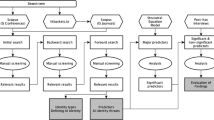For “A Faustian Exchange: What is it to be human in the era of Ubiquitous Technology?”.
Abstract
It is supposedly easier to connect with other human beings in the era of ubiquitous technology. Connecting requires action and an element of risk taking in a context of dynamic uncertainty and incomplete information. The article explores what is involved in developing sustainable connections. We reflect on the context of “Socially Useful Artificial Intelligence”, the focus of the first article in issue 1.1.1987 of AI & Society, and explore subsequent research in a changing world. The arguments are illustrated through an account of the development of the Penny University, from a London coffee house to a potential international virtual institution.
Similar content being viewed by others
References
Chapagain D (2006) A Guide to Students’ Quality Circles. Quest-Nepal, Kathmandu
Ekman M, Gustavsen B, Asheim B, Pålshaugen O (eds) (2011) Learning regional innovation. Palgrave, Basingstoke
Ennals R (1986) Star wars: a question of initiative. Wiley, Chichester
Ennals R (ed) (1999, 2000, 2001) Work life 2000 yearbooks 1, 2, 3. Springer, London
Ennals R (2007) From slavery to citizenship. Wiley, Chichester
Ennals R, Salomon R (eds) (2011) Older workers in a sustainable society. Peter Lang, Frankfurt
Forster EM (1910) Howards End. Penguin, London
Göranzon B (ed) (1995) Skill, technology and enlightenment: on practical philosophy. Springer, London
Göranzon B, Hammarén M, Ennals R (eds) (2006) Dialogue, skill and tacit knowledge. Wiley, Chichester
Gustavsen B (2004) Making knowledge actionable: from theoretical centralism to distributive constructivism. Concepts Transform 9(2):147–180
Habermas J (1989) The structural transformation of the public sphere. English translation Polity, London
Hutchins D (2008) Hoshin Kanri: the strategic approach to continuous improvement. Gower, Farnham
Ishikawa K (1980) QC circle Koryo: general principles of the QC circle. Japanese Union of Scientists and Engineers, Tokyo
Johnsen HCG, Ennals R (2012) Creating collaborative advantage. Gower, Farnham (in press)
Land FF (1982) “Socio-technical approach to systems analysis and development”. In Systems Development Conference, No 10, Butler Cox Foundation
Li Z (2011) A socio-technical approach for mobile health informatics: case studies in Community Healthcare Service Centres in China. PhD, Kingston Business School
Mumford E (2006) The story of socio-technical design: reflections on its successes, failures and potential. Inform Syst J 16(4):317–342
Normann R (2012) “The collaborative dilemma of network based development”. In: Johnsen HCG, Ennals R (eds) Creating collaborative advantage. Gower, Farnham (in press)
Putnam R (1993) Making democracy work: civic traditions in modern Italy. Princeton University Press, Princeton, NJ
Rachele J (2012) “The diversity quality cycle: driving culture change through innovative governance”. AI & Society. Special issue “Communities of Circles” (in press)
Snow CP (1959) The two cultures. Rede Lecture, London
Stiglitz J (2002) Globalisation and its discontents. Cape, London
Syedan J (2010) The coffee shop as a social resource. Masters dissertation, Kingston Business School
Totterdill P, Ennals R, Exton R (2012) Workplace innovation: the challenge for public policy. Gower, Farnham. (in press)
Toulmin S (2001) Return to reason. Harvard University Press, Cambridge
Willetts D (2010) The pinch. Atlantic, London
Wittgenstein L (1922) Tractatus Logico-Philosophicus. Routledge, London
Wittgenstein L (1951) Philosophical investigations. Blackwell, Oxford
Wolsk D (1975) Experience-centred curriculum. UNESCO, Copenhagen
Acknowledgments
I am grateful for the comments from colleagues at Kingston Business School (Business Information Technology and Global Information Technology); Agder University, Norway (Innovation and Knowledge Development); Linnaeus University, Sweden (Skill and Technology); and Mykolas Romeris University, Lithuania (Social Technologies), and from international partners in exploratory activity for the Penny University.
Author information
Authors and Affiliations
Corresponding author
Rights and permissions
About this article
Cite this article
Ennals, R. Only connect. AI & Soc 28, 219–225 (2013). https://doi.org/10.1007/s00146-012-0424-0
Received:
Accepted:
Published:
Issue Date:
DOI: https://doi.org/10.1007/s00146-012-0424-0



